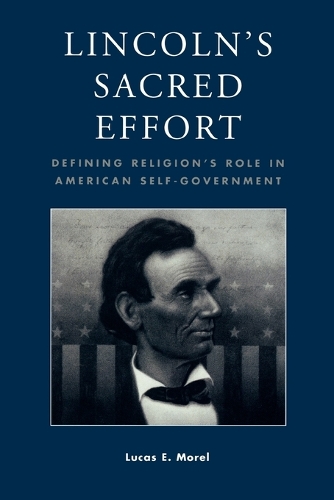
Lincoln's Sacred Effort: Defining Religion's Role in American Self-Government
(Paperback)
Publishing Details
Lincoln's Sacred Effort: Defining Religion's Role in American Self-Government
By (Author) Lucas E. Morel
Bloomsbury Publishing PLC
Lexington Books
19th January 2000
United States
Classifications
Tertiary Education
Non Fiction
Religion and beliefs
973.7
Physical Properties
Paperback
264
Width 157mm, Height 231mm, Spine 14mm
370g
Description
In this text, Lucas Morel examines what the public life of Abraham Lincoln teaches about the role of religion in a self-governing society. Lincon's understanding of the requirements of republican government led him to accommodate and direct religios sentiment toward responsioble self-government. As a successful republic requires a moral or self-controlled people, Lincoln believed, the moral and religious sensibilities of a society should be nurtured.
Reviews
Morel has produced a solid, useful addition to the Lincoln literature. -- Professor Michael Burlingame, Distinguished Chair in Lincoln Studies at the University of Illinois-Springfield and author of Abraham Lincoln: A Life * North Carolina Historical Review *
Morel's work draws considerablyas he acknowledgesfrom Crisis of the House Divided, my book on the Lincoln-Douglas debates published forty years ago, especially from the chapters on the Lyceum and Temperance speeches. However, Morel gives a thoroughly fresh reading of those speeches, and discovers in them dozens of biblical references, allusions, and paraphrases that I had not noticed or identified. In addition, he locates these texts within the framework of church history and church controversycontemporaneous with Lincoln. How Lincoln negotiated his way amidst sectarian differences, enlisting religious dispositions for non-sectarian political ends, especially in his Second Inaugural, is described with great sensitivity and great precision.I can say candidly that I learned a great deal from reading this book.. -- Harry V. Jaffa, Philosophy Emeritus, Claremont McKenna College and Claremont Graduate School
Morel's work draws considerablyas he acknowledgesfrom Crisis of the House Divided, my book on the Lincoln-Douglas debates published forty years ago, especially from the chapters on the Lyceum and Temperance speeches. However, Morel gives a thoroughly fresh reading of those speeches, and discovers in them dozens of biblical references, allusions, and paraphrases that I had not noticed or identified. In addition, he locates these texts within the framework of church history and church controversy contemporaneous with Lincoln. How Lincoln negotiated his way amidst sectarian differences, enlisting religious dispositions for non-sectarian political ends, especially in his Second Inaugural, is described with great sensitivity and great precision. I can say candidly that I learned a great deal from reading this book. -- Harry V. Jaffa, Philosophy Emeritus, Claremont McKenna College and Claremont Graduate School
Author Bio
Lucas E. Morel is Assistant Professor of Politics at Washington and Lee University.
